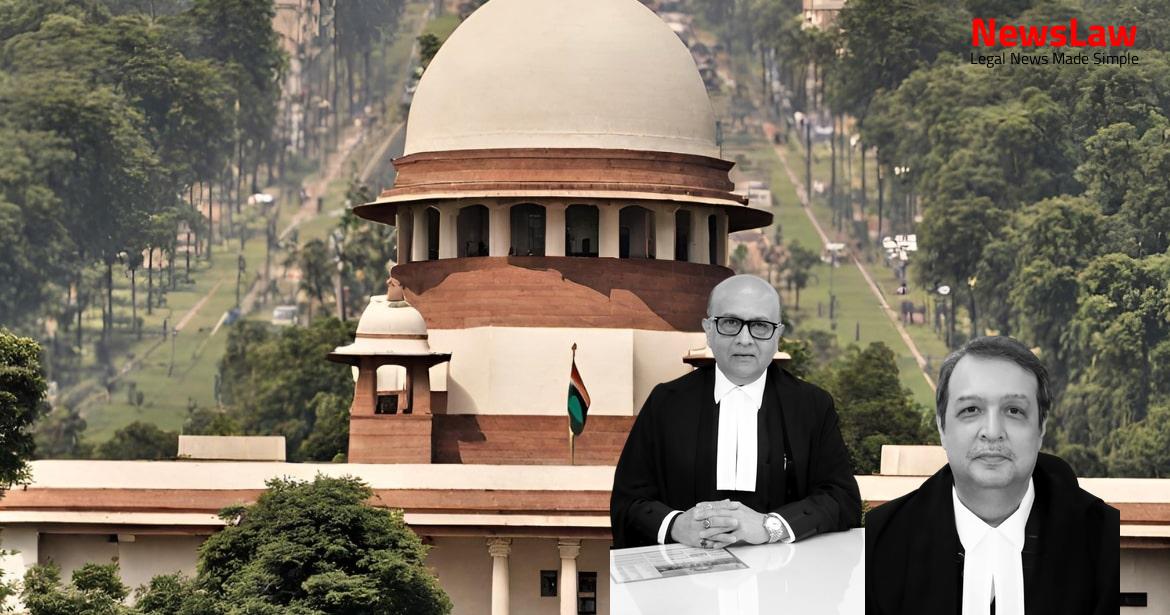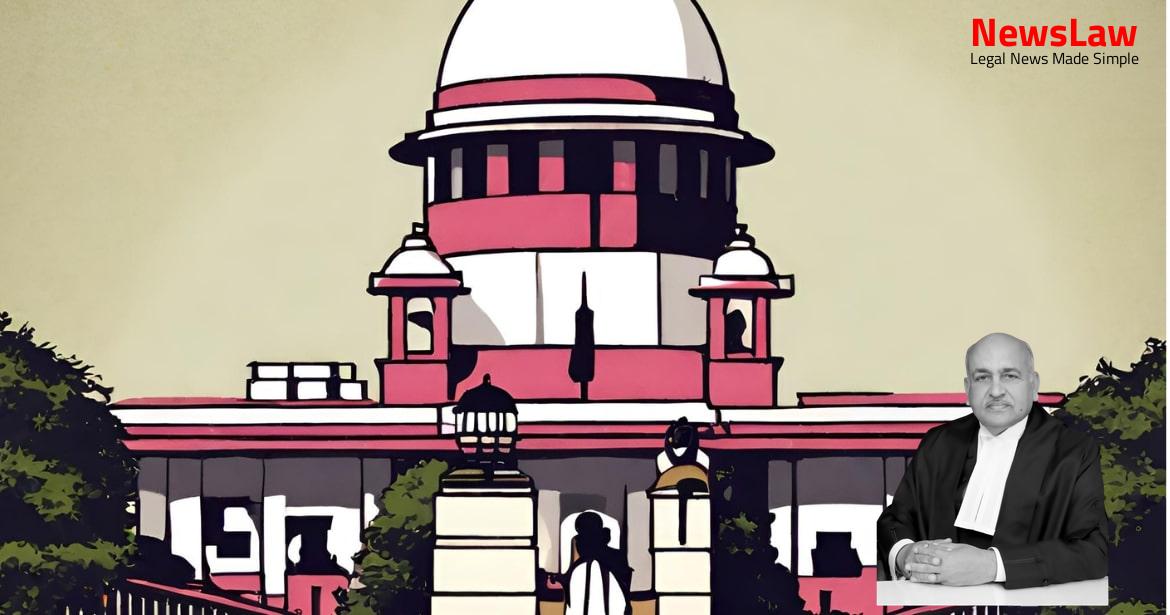In the case of Nenavath Ravi vs. State of Telangana, the High Court has rejected the writ petition filed by the appellant detenu challenging the preventive detention order. However, in a turn of events, the order of detention has been quashed and set aside, setting the detenu at liberty forthwith. The appeal succeeded, leading to a crucial legal victory for the detenu. The State’s decision and the detaining authority’s actions have been overturned, bringing relief to Nenavath Ravi in this landmark case.
Facts
- The offender, Nenavath Ravi, was involved in several property theft offences and gold chain snatching offences, which were committed continuously and repeatedly in quick succession.
- Multiple offences were registered against Nenavath Ravi, with some being considered as grounds for his detention.
- Nenavath Ravi was released in two ground cases and granted bail in others.
- The bail petition was dismissed on 24-08-2023.
- Seized stolen property and vehicles used in the offences were retrieved at the instance of associates.
- The offender was involved in activities creating fear and panic among the public, especially women.
- The order of detention under the Telangana Prevention of Dangerous Activities Act was invoked against Nenavath Ravi.
- The Detaining Authority deemed Nenavath Ravi a “Goonda” based on his criminal activities detrimental to public order.
- The High Court rejected the writ petition filed by Nenavath Ravi challenging the detention order.
- Police conducted thorough investigations and collection of evidence to establish the involvement of Nenavath Ravi and his associates in criminal activities.
- The detaining authority considered the commission of offences and their impact on public order, along with the modus operandi used by the detenus.
- The detention order was passed to prevent the detenus from engaging in similar offences.
- The detenus were involved in robbery, chain snatchings, and creating panic among the public, particularly women.
- Their unlawful activities disturbed peace and tranquility in society.
- Police seized motorbikes used in the commission of the offences.
Also Read: Legal Analysis on Abetment of Suicide
Issue
- The issue in consideration is whether the High Court erred in rejecting the writ petition filed by the appellant detenu and affirming the preventive detention order.
- The interpretation of Sections 2(a) and 2(g) of the Act 1986 is crucial in determining the legality of the detaining authority’s decision.
- The Act 1986 aims to prevent crime and protect society from anti-social elements by detaining habitual criminals and dangerous individuals.
- The Act is specifically designed to address hardened and repeat offenders who are not deterred by ordinary penal provisions.
Arguments
- The learned counsel for the appellant detenu argues that the State should have opted for cancellation of bail instead of preventive detention if the appellant was released on bail by criminal courts
- When an accused is granted bail, it is implied that the accused shall not engage in any illegal activities in the future, even if this condition is not explicitly mentioned in the bail order
- The counsel highlights that some courts do impose such conditions when granting bail
- The counsel requests the setting aside of the High Court’s judgment and the quashing of the preventive detention order, with a directive to release the appellant detenu immediately
- No error of law found in the High Court’s judgment and order.
- The Authority relied on four cases of chain snatching as mentioned in the petitioner’s ground before the High Court.
Analysis
- The power of preventive detention is to be exercised with great care, caution, and restraint.
- The purpose of the Telangana Offenders Act, 1986 is to prevent individuals from acting in a manner prejudicial to public order.
- The order of preventive detention should be based on relevant and vital material to justify detention.
- The satisfaction of the detaining authority must be based on objective facts rather than caprice or irrelevant considerations.
- The distinction between ‘law and order’ and ‘public order’ lies in the degree and reach of the act on society.
- The Advisory Board plays a crucial role in ensuring the legality and necessity of a detention order.
- The Advisory Board must consider all aspects, not just the detaining authority’s satisfaction, when reviewing an order of detention.
- The purpose of preventive detention is to prevent future illegal activities prejudicial to public order.
- The determination of public order disturbance should be based on specific activities affecting society.
- The writ of habeas corpus is a vital safeguard against arbitrary detention and is a constitutional remedy.
- The detention order requires clear and categorical justification based on relevant material.
- The detaining authority must apply its mind to pertinent and proximate matters while eschewing irrelevant considerations.
- The writ of habeas corpus is a powerful remedy against unlawful detention that cannot be refused as a matter of right.
- The distinction between punitive detention and preventive detention should be recognized.
- Orders of preventive detention should be based on potentiality to disturb public order, not mere repetition of offenses.
- The Advisory Board should assess the sufficiency of cause for detention independently of the detaining authority.
- The Advisory Board plays a crucial role in independently reviewing detention orders under the Act, considering all materials and forming an opinion on the necessity of detention.
- When there is a difference of opinion among Advisory Board members, the majority opinion prevails.
- If the Advisory Board reports sufficient cause for detention, the government can confirm the order and continue detention, or revoke the order if the Board finds no sufficient cause.
- Habeas Corpus allows the Court to review the legality of an individual’s imprisonment by examining the reasons for detention.
- Mere registration of FIRs is not enough to justify preventive detention under the Act 1986.
- The Act empowers the Advisory Board to call for additional information or hear the detenu to ascertain the sufficiency of cause for detention.
- The detaining authority must have reasons to believe the individual is a ‘GOONDA’ habitually committing certain offenses under the IPC for a lawful detention order.
- The Act specifies the power of the State Government and district officials to prevent individuals from acting prejudicially to public order.
- The Advisory Board must submit a report within seven weeks, detailing the opinion on the necessity of detention.
- The writ of Habeas Corpus is a fundamental right protecting personal liberty under Article 21 of the Indian Constitution.
- If the Advisory Board finds sufficient cause for detention, the government may confirm or revoke the order based on their discretion.
- The Advisory Board is empowered to consider materials, request additional information, hear the detenu if desired, and submit a written report on the justification for detention.
- In the case of Ameena Begum v. State of Telangana and Others, a similar situation was addressed by a two-Judge Bench of the Court.
- The Court emphasized the importance of proper application of mind by the detaining authority in preventive detention orders.
- Mere reference to pending criminal cases without a clear causal connection does not suffice as a reason for detention.
- Stale incidents cannot be the sole basis for a detention order, as they have no bearing on future prejudicial activities.
- The decision in Shibban Lal Saksena v. State of Uttar Pradesh highlighted the requirements for a valid detention order challenged through a habeas corpus petition.
- Habeas corpus is a prerogative writ used historically to compel proper conduct by authorities.
- The legality of detention can be questioned through an application for a writ of habeas corpus.
- The sufficiency of the grounds for satisfaction leading to detention cannot be challenged in court unless on the basis of mala fides.
- The writ of habeas corpus is a prerogative, extraordinary remedy used when other legal remedies are inadequate or inapplicable.
- The court’s role in reviewing detention orders is essential when they are passed mechanically without proper application of mind.
- Advisory Boards under preventive detention legislation must thoroughly scrutinize detention orders
- They must appreciate all aspects and angles before expressing an opinion
- Advisory Boards should not mechanically approve detention orders
- Advisory Boards must adhere to the mandate of Article 22(4) of the Constitution of India
Decision
- The order of detention is quashed and set aside.
- Impugned judgment and order passed by the High Court is set aside.
- The appeal is allowed and succeeds.
- The connected Criminal Appeal of the co-detenu is also allowed and disposed of for the same reasons.
- The appellant detenu to be set at liberty forthwith if not required in any other case.
- The order of detention passed against the co-detenu is also quashed and set aside.
Case Title: NENAVATH BUJJI Vs. THE STATE OF TELANGANA (2024 INSC 239)
Case Number: Crl.A. No.-001738-001739 / 2024



